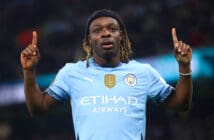Embed from Getty Images
Ralph Hasenhuttl’s strained cries of come on paled into the Wembley night.
Clad in black, like a mourner awaiting the inevitable, the Southampton boss watched on. His players, meanwhile, opted to sit by the sword, rather than dying on it.
The match had just entered four minutes of additional time but there would be no last hurrah, or one final honourable stand. Not even the grandest of the stages could hide where this side find themselves. Not even Wembley could mask the jarring truth.
The Hasenhuttl machine, once built on belief and underpinned by trust, is malfunctioning so violently and uncontrollably that the ramifications look ominous.
Defeat upon the biggest stage English football has to offer felt different to the rest. This was one draped in regret and rife with ire. While supporters were indignant as they watched their team serve up one of the weakest Wembley rallies in recent history through the confinements of their living room, those on the pitch appeared indifferent.
Even Hasenhuttl, the man who has always held such a tight-knit kinship with fans, afterwards spoke with words that didn’t appear quite in touch with the general feeling.
“We tried a lot and worked a lot against the ball”, said Hasenhuttl. “The performance was absolutely okay. “We had some moments after a few good balls wins. A lot of good ball wins. We were good working against the ball.
“I think (if) we put the same effort in on Wednesday (against Tottenham) we have a chance to take something.”
When the final whistle did eventually ring around the crucible of Wembley, four Southampton players collapsed to their haunches – akin to that night against Liverpool in January. That was the only thing that drew any semblance of similarity between the performances. On a physical and psychological level, the two matches were not just mere world’s apart; there were galaxies separating them.
The players weren’t sprawled across the Wembley turf through pure exhaustion or delight this time. Instead, they reflected the current set of circumstances. There was a lethargy in the side’s mentality, lurking from one potential pothole to another and going through the motions in such plain sight that they looked sorry for themselves. Especially once Leicester rebuffed their token effort to get back into the game.
Most significantly, however, it showed that the Ralph Hasenhuttl era is in danger of tailspinning towards the oblivion.
What makes the decay of recent months so acute and unforeseen is the lack of warning. Quite simply, it is at odds with everything a Hasenhuttl Southampton used to stand for. Heck, it wasn’t that long ago that if this team did lose, they would go down in blazing flames at least trying. Most of the time with a vat of petrol poured over them for good measure.
Sunday possessed none of those once indelible traits. No chasing of second balls, no shots on target – none of the prerequisites that had previously been a non-negotiable under Hasenhuttl. Leicester, though set-up proficiently in structure but still not at their well-oiled best, ran amok in the final twenty minutes. A time when Southampton were supposed to be chasing the game.
If it wasn’t clear beforehand that a sense of apathy has pervaded through the team, then the last moments of the game all but affirmed it. The same-old perennial feeling of doubt and general malaise seeped through the team and had reached the stage where they were simply waiting for the sound of Chris Kavanagh’s final whistle as a means to an end.
They manner in which Saints would let an FA Cup semi-final peter out into nothingness gave further credence to the deep-seated culture issues that exist and are unarguably entrenched into club foundations. For all the attempts of key individuals, both past and present, to arrest the millstone that’s been firmly lodged around the club’s neck, the same perpetual feelings of vulnerability refuse to cease.
This was supposed to be Southampton’s defining game of the season. Possibly Hasenhuttl’s one as manager. No one could have underestimated the magnitude of the event or the day – this was a glorious opportunity to reach the final of Europe’s most fabled domestic competition.
Considering Hasenhuttl has repeatedly acknowledged that the FA Cup run has sacrificed Premier League points, it should have been a given that the team would go out on their shield, whatever the end result.
But this Southampton is fraught with unexplainable contradictions. They are, to quote Gary Neville who said it about Manchester United, ‘an odd bunch’. Melancholy has permeated through the very core of this team, as it did under the last three managers. Bad luck turns into bad form turns into apathy. The end result usually results in treading the edge of the precipice.
How that sense of disengagement transpires is intangible. It spreads in a virus-like manner and is very difficult to shake. For a club like Southampton, even during the good times and throughout the ownership of Gao Jisheng, there has always been a clear understanding that they must maximise their physical output to compensate for the shortfall of quality in the team. Having neither, which also happens to coincide with a drop-off in mental resilience, means it’s likely to only end one way.
Southampton’s lack of in-game adaptation is a recurrent theme. While this writer has pointed out the absence of communication amongst the team, the failure to recognise the early foreshadowing of Leicester’s tactical set-up showed naivety. It envelops the notion that this team comes up short every time they are posed questions tactically.
During the run-up to Sunday’s game, the message was clear from Brendan Rodgers – press when they want to rest. Rodgers recognised Hasenhuttl uses Jannik Vestergaard as the side’s chief instigator to fluctuate the rhythms of a match. The Dane’s ball retention qualities often provide a disguised breather to the team.
Rodgers understood that by pressing high and sporadically, Southampton’s rhythm would be thrown off-kilter. The body shape of Leicester’s front two quickly coaxed Vestergaard and Jan Bednarek into playing into central areas, where they would then set traps.
Saints soon took the bait. Leicester used Ibrahima Diallo as their pressing trigger. Diallo’s propensity to take more touches than required on the ball, as opposed to James Ward-Prowse’s and Oriol Romeu’s ‘give it and go’ approach, gave them frequent, regular opportunities to provoke a turnover high and in dangerous areas of the pitch.
Though the early warnings signs were so obvious they were unveiled with illumination, Southampton wouldn’t or couldn’t learn. Diallo was swiftly booked and had it not been for Jamie Vardy chipping over later on, things could have been much worse.
But unlike recent times, Southampton had got to half time level and without the proverbial mountain to climb. Sure they lacked belief – the amount of times they passed it back to Fraser Forster after getting into a good positions demonstrated this – but they were still in the game.
There had been subtle, yet telling signs that if Saints could offer more of their best work, playing vertical and cranking up the tempo, they were more than a live underdog. There was now 45 minutes left to leave Wembley stadium void of regret and ensure something came good on the back-off a jilted league campaign. The half-time team-talk should have proved a seminal 15 minutes.
But old habits die hard and Southampton’s ultimate kryptonite came to the fore again. Rodgers’ decision to adopt a 3-5-2 shape meant that when Saints did press, punctuated by the lack of necessary vigour or cohesion, Leicester were left with a two-on-two up front. More pertinently, the system enabled Jamie Vardy to isolate and run at Jan Bednarek, exposing the obvious gulf in speed between the two.
With Hasenhuttl’s approach to defending very much along the lines of ‘see-ball-win-ball’, Vardy would entice the Pole all night, taking him into uncomfortable, high areas on the pitch before darting in-behind. There were forebodings in the first half, when Vardy should have scored.
Southampton’s failure to readdress the flagrant imbalance at the break or during the game only emboldened Leicester and Vardy’s attitude to expose it. And as we know by now, they certainly did.
Hasenhuttl must re-examine his methods in 2021, too. While it is not unusual for a modern day manager to look to tweak their system as opposed to overhauling it, the Saints boss must find a way of his side solving technical and tactical puzzles during a game.
Right now, Southampton continue to sleepwalk into traps and lay fallible to deception. The lack of nous and in-game flexibility is a stark contrast to the principles Hasenhuttl had once created.
No longer are they the master of the dark arts or the team capable of overwhelming opponents through sheer physical exertion alone. Teams are working out the fine nuances of the Hasenhuttl brand of football and as of now, the players and manager are yet to find a functional solution.
The Austrian’s words after the game did little to defuse the growing tension amongst the fanbase. Statements such as claiming his side left ‘everything on the pitch’ only added to the angst.
The club will be confined to limbo until the sale of the club is complete to a prospective buyer. Until if and when that happens, those who manage the day-to-day runnings of the club must ensure the side tread Premier League waters without sinking under.
Hasenhuttl and chief executive Martin Semmens have done plenty of good work in attempting to recalibrate the foundations of the club. Nevertheless, questions are beginning to be asked regardless of the mire the silent owner, who has not been seen or heard for the best part of two years, has created.
This is what freefall looks like. On Sunday, Southampton and Hasenhuttl passed up on a defining night at Wembley. Now they must stop the same from happening again this summer.
Follow us on Twitter @ProstInt
![Prost International [PINT]](https://prostinternational.com/wp-content/uploads/2021/08/PINTtFontLogoRoboto1536x78.jpg)


